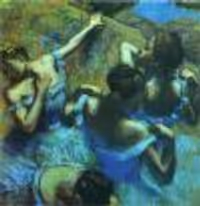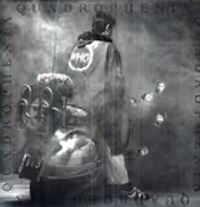Does Melchior rape Wendla in SPRING AWAKENING?
#175does melky rape wendy?
Posted: 2/4/08 at 5:59pmExactly, snl. That's all you're saying because you KNOW there's no evidence to prove Melchior doesn't know about rape as you've repeatedly claimed and don't want to admit you have nothing to back up your argument. "Case closed."
Wanting life but never knowing how
#176does melky rape wendy?
Posted: 2/4/08 at 6:24pm
I think the difficulty is that rape is an incredibly broad term. The fact of the matter is that violent, incestuous rape, while one of the most awful types, is NOT the only type. That doesn't mean that, just because one form of rape ended up less emotionally damaging to the victim, it's not rape. I understand SNL when she says she doesn't want to put Melchior and Martha's father in the same category; they're clearly entirely different cases. But to say that Melchior does not rape Wendla is, in my opinion, damaging to the cases of women who have gone through similar situations of saying no, being pushed, and eventually giving in. The differences between these cases and ones like Martha's (of violent, forced incest) obviously exist, but the similarity is that they have all been raped. You can be raped when a good part of you WANTS to have sex. Just because someone feels the urge and attraction and hormones doesn't mean they still can't say no for whatever reason. And just because they get physical enjoyment doesn't mean it wasn't rape.
And I think that the classics cited by others in this discussion have made it clear that rape would definitely be a topic known to Melchior.
Craww
Broadway Legend Joined: 12/13/06
#177does melky rape wendy?
Posted: 2/4/08 at 6:29pm
-it's still painfully obvious that their society did NOT have the same "no means no" standards we have today-
-How do you know that? How is that "painfully obvious?"-
I agree that what Melchior does is rape, but I disagree with this point. It seems like willful ignorance to purport that society to have had a healthy, feminist, enlightened view on the subject of rape. I mean, it is painfully obvious there wouldn't be a No Means No standard at that time, because No Means No (as a rally cry, as something a society would teach their young women and young men alike) places the blame on the perpetrator. While rape would certainly never be something encouraged of a young man, the shame and the blame would most likely fall on the woman. And forget about the idea of a man raping his wife. There's no way the society portrayed in Spring Awakening would consider that as anything but a man's right and duty.
I don't agree with SNL, and I see why people can find some of the defenses somewhat startling. But I think the discussion is definitely devolving when a respectful poster is being shamed and condescended to because they've taken up the controversial defense. If you can admit that there is a flaw in the writing, it doesn't seem fair to say so and in the same post belittle someone for interpreting something the way it was intended to be interpreted.
The elevation of Melchior as the hero of the piece after all of his manipulation and selfishness is such an uncomfortable, irresponsible, and maddening thing to have to watch play out. But I think the supposed danger and villainy of actually viewing him as a defensible protagonist is being a bit overstated.
#178does melky rape wendy?
Posted: 2/4/08 at 8:26pmBut there is no accusation of rape being made. Critically its still a valid discussion, but legally, there's no case without an accuser. I know some of you want to see "Degrassi Justice" but who knows what Wendla's response would be if Melchior was able to reach her in time. I don't find the writing to be flawed in this situation. Written and staged the way it is, begs for it to be examined.
bsherms
Swing Joined: 2/2/08
#179does melky rape wendy?
Posted: 2/4/08 at 8:50pm
Everyone should understand that the musical is NOT Wedekinde's play, nor is it ever supposed to be. It's Sater and Sheik's INTERPRETATION of Wedekind's play. Sater and Sheik view the story (and they have repeatedly said the following) as a parable NOT on the dangers of sexuality, but on the dangers of miscommunication between the knowledgeable and the unknowledgeable. Wedekind's play is a very wonderful piece, but it is not and never should it be comparable to Spring Awakening; that's like comparing the POTO novel with the POTO musical--they are two completely different entities with two completely different messages, and some of the characters have complete face-lifts. Some aren't even there at all.
In defining Melchior's "rape" of Wendla, in the musical's case, you have to look at it in the musical's context. Based on the libretto OF THE MUSICAL, Melchior is a relatively naive boy. He finds things out by reading books, yes, but that by no means translates into his actually understanding those things in their entirety. Hell, the kid giggles when Moritz asks specific questions about everything "fitting". He draws pictures and uses medical terminology to describe sex to Moritz, and, when asked about the girl's experience, he replies: "I just put myself in her shoes and imagine." Which is evidence to the fact that he does not in fact really know what the girl experiences.
The actual sex scene is, by definition, not rape. When Wendla says no, Melchior STOPS what he is doing BOTH TIMES. It is WENDLA who reinitiates it both times--the first by kissing him, the second by placing his hand on her breast. In the context of the musical, then, it cannot be defined as rape. Thus, in the context of the musical, rape is not romanticized, as it does not exist in the first place.
The musical's message is the consequences of miscommunication. The play's message is the consequences and dangers of sexuality. Two completely different messages, two completely different scenes.
george95
Broadway Legend Joined: 1/1/08
#180does melky rape wendy?
Posted: 2/4/08 at 9:57pm
So bsherms, you say its not rape because Melchior stops both times that Wendla tells him to and that she intiates the sex both times.
But eastvillage wrote earlier that "Once the no word is said you're in rape territory -- no matter what happens afterwards"
So which one of is right?
And is this a case of putting 21st century ethics on 19th century characters?
#181does melky rape wendy?
Posted: 2/4/08 at 11:20pm
I'm disappointed that it seems like you got the idea that I suggested that academic discourse must be stale and boring. Nothing is further from the truth, especially when it comes to a shockingly emotionaly topic like rape.
This:
"this thread could be a real actual discussion if it werent for the mean-spiritedness."
seemed to indicate that this could only be a "real" discussion if not for the heated nature. But I'm glad you don't actually think academics can't be emotional, because that'd be very sad.
I think the show does ask you to have affection for Melchior. There's a lot that's likable about him, especially in the way he's set up. He's smart, he's popular, he's cute, he seems like a caring enough guy. But good theatrical characters are built to be like real people. They aren't clean-cut good and bad. So to say imply that we're supposed to feel pity for Melchior as some sort of "courtesy" just because part of his character is sympathetic, is something I have a bit of trouble with. I do agree that he's a tragic character, largely because of his mistakes, but again, that doesn't mean we can't point fingers at him. I understand liking a character. I really do. But liking or having affection for a character shouldn't stop you from being able to look at his or her actions critically, and at the end of the day, as a device within the drama. It shouldn't make you look at that person in clear-cut, black and white terms of good and bad.
Craww
Broadway Legend Joined: 12/13/06
#182does melky rape wendy?
Posted: 2/4/08 at 11:56pmThey should have just let the reform school boys carry through on their Melchior gangbang. Then he'd no longer have to just put himself in her place, and imagine.
george95
Broadway Legend Joined: 1/1/08
#183does melky rape wendy?
Posted: 2/5/08 at 12:22amoh man that reform school scene was so awkward to explain to the juniors I brought to the show last month....I used as many euphemisms as I could.
bsherms
Swing Joined: 2/2/08
#184does melky rape wendy?
Posted: 2/5/08 at 6:38pm
"So bsherms, you say its not rape because Melchior stops both times that Wendla tells him to and that she intiates the sex both times.
But eastvillage wrote earlier that "Once the no word is said you're in rape territory -- no matter what happens afterwards"
So which one of is right? "
I disagree, personally, with eastvillage. Honestly, if the victim initiaites the sex, then they are not a victim.
Craww
Broadway Legend Joined: 12/13/06
#185does melky rape wendy?
Posted: 2/5/08 at 6:56pm
Just by consenting to let him continue touching and kissing her, she didn't initiate the sex. She couldn't, because we're supposed to believe that she literally has no idea what sexual intercourse entails.
She didn't know what the act was, let alone the consequences. There's basically nothing it could be but a form of rape.
snl89
Broadway Legend Joined: 10/4/05
#186does melky rape wendy?
Posted: 2/5/08 at 7:35pm
So... just a thought, or question rather.
In 1800s German society, when was it that people WOULD learn about sex, anyway? Obviously after marriage and everything, but it's just.. Wendla's mother was SO uncomfortable talking to her about it. It would have had to have been explained to her at SOME point anyway, wouldn't it have? Because obviously if two people grow up knowing nothing of sex, it's not like they're going to get married and then suddenly know about sex haha.
But I was kind of just thinking of that, because if it were the kind of deal where they got married and then only the MAN was told about sex and everything so that he could initiate it(which I have no clue if it was or not, but it seems more or less plausable for that society), then even after marriage, by the standards just stated (that any time a person does not know what sex is and therefor cannot truly consent, it is rape), most sex back then would have technically been rape. Although I guess if he had been told and then he explained it to his wife or whatever before hand. But still, it's confusing! lol
sorry, that's getting kind of off topic, and very rambly, but I was just thinking about it haha
bsherms
Swing Joined: 2/2/08
#187does melky rape wendy?
Posted: 2/6/08 at 6:45pm
"Just by consenting to let him continue touching and kissing her, she didn't initiate the sex. "
True, just consenting is not initiating. However, as I've said multiple times, in the musical Melchior stops both times she says no. The first time, Wendla says no as he's trying to kiss her. Melchior stops, and Wendla ends up kissing him to continue what they are doing. The second time she says no and he stops, taking his hand off her chest. She proceeds to place it back onto her chest.
If that's not re-initiation, I don't know what is.
As well, there are no signs at all during the rest of the play that she was scarred, physically or mentally, in any way. She never regrets what she has done with Melchior--in fact, she often says how she wants to spend more time with him. Right after the sex scene, Melchior and Wendla are kissing, and Wendla sings how it was "sweet and unknown". How can it be a rape if the "victim" does not consider herself as one?
Updated On: 2/6/08 at 06:45 PM
#188does melky rape wendy?
Posted: 2/6/08 at 7:24pmShe doesn't re-initiate sex because that is not an invitation for sex. "Touch my boob" does not mean "Put your penis in me." It means "Touch my boob and maybe some point in the future, I'll let you put your penis in me." That's like claiming "She kissed him back" means it's not rape. Permission for one act is not permission for everything.
Wanting life but never knowing how
bsherms
Swing Joined: 2/2/08
#189does melky rape wendy?
Posted: 2/6/08 at 9:37pmAnd yet those are the only two times she says no in the musical. And, as I already mentioned, she does not seem to regret the act. So, once again, I ask: how is she a rape victim if she does not feel victimized in any way?
#190does melky rape wendy?
Posted: 2/6/08 at 9:52pmThis was already addressed earlier in the thread by a point sweetestsirent made. I suggest you go reread that discussion.
Wanting life but never knowing how
#191does melky rape wendy?
Posted: 2/7/08 at 2:06am
"So, once again, I ask: how is she a rape victim if she does not feel victimized in any way?"
How do you have consensual sex with someone who doesn't know what sex is?
bsherms
Swing Joined: 2/2/08
#192does melky rape wendy?
Posted: 2/7/08 at 6:16pm
So, because she does not realize the full extent to what she is consenting to, that makes it rape? I see where you are coming from, but even if it is rape by definition (which I disagree about), the fact that Wendla is not emotionally scarred defies that. Rape is something the victim feels victimized about. Even when Wendla learns about what sex leads to, she still does not regret having it with Melchior. Wendla does not consider herself a victim. Wendla considers it consensual. Even if you do not think it was, Wendla very obviously, throughout the musical, gives evidence that she does not think it was rape, and she does not consider herself a victim.
So how is it rape if there is no victim?
#195does melky rape wendy?
Posted: 2/8/08 at 2:39amDunkin Sheik wrote in the preface of the book of the play, "In Wedekind's script, Melchior 'date rapes' Wendla. We wanted him to make love to her...he helps Wendla discover her sexual awakening." And even better, in the preface to the acual play, Jonathan Franzen rips Spring Awakening a new one, and says, amoung other things, "The casual rape of Wendla Bergmann by the play's central character, Melchior Gabor, becomes a thunderous spectacle of ecstasy and consent."
Craww
Broadway Legend Joined: 12/13/06
#196does melky rape wendy?
Posted: 2/8/08 at 3:07am
So how is it rape if there is no victim?
If admitted shame, sadness, regret, or suffering from the victim was required to classify it 'rape', there wouldn't be any such thing as 'statutory rape'. A 13 year old who concedes to sex with a 19 year old is being raped, even if she enjoys it and feels confident in the rightness of it. Probably thinking to herself "I let him love me".
But, usually, it will have a negative impact on a girl to be sexualized that young. Especially by an adult man, self aware and controlling the situation. Whether she feels it, whether she admits it, it will probably manifest. For Wendla, it manifested in her pregnancy and subsequent death. Thus, making her a victim of an act that she didn't understand.
bsherms
Swing Joined: 2/2/08
#197does melky rape wendy?
Posted: 2/13/08 at 1:01pm
Okay, I see where you're coming from, Craww, and it makes sense. However, I still disagree strongly. In my mind, you're putting words in Wendla's mouth. To others, she is victimized. But Wendla never gives even a hint that she regrets or is suffering from the sex she had with Melchior in any way. You can view her death as a result of your perceived "rape", if you want, but you can also view her death as the sad result of a fearful and restricted society.
And on a slightly related note: why is it that Romeo (who is sixteen or seventeen) is not attacked for having sex with Juliet (who is thirteen), while Melchior, who is the same age as Wendla, is? Is it because Melchior's was pre-marital? Even if this is so, Melchior intimates in his letters to Wendla that he plans on spending the rest of his life with her--before he finds out she's pregnant.
(P.S., I love your icon)
#198does melky rape wendy?
Posted: 2/13/08 at 9:06pmYou missed the point of Craww's comparison to statutory rape. And Shakespeare never implies Juliet does not know what sex is. Spring Awakening makes a point that Wendla did not. Your comparison isn't valid.
Wanting life but never knowing how
Carolyn91
Swing Joined: 5/12/10
#199does melky rape wendy?
Posted: 5/12/10 at 9:04pmI would disagree that the writers of this adaptation were cowardly. Unfortunately, to get the message (which is a good one) out to the masses, they had to commercialize. Whether I agree or disagree with the choice is irrelevant but these "radical" ideas were brought to a mainstream audience with rock and roll and a bit of commercializing. As long as people walk away with the essential message, maybe even find Wedekind's original and read that, I'm happy.
#200does melky rape wendy?
Posted: 5/12/10 at 9:12pmomg. Why is this thread back?!
Videos







